
Thomas A. Constantine served as the 6th Administrator of the Drug Enforcement Administration (DEA) from March 1994 to July 1999.

The Campaign Against Marijuana Planting (CAMP) is a multi-agency law enforcement task force managed by the California Department of Justice and composed of local, state and federal agencies organized expressly to eradicate illegal cannabis cultivation and trafficking in California. Since its establishment in 1983, more than 110 agencies having participated, making CAMP one of the largest law enforcement task force in the United States.

The Central Narcotics Bureau (CNB) is a department under the Ministry of Home Affairs (MHA) tasked to combat drug trafficking and distribution and is responsible for coordinating all matters pertaining to drug eradication in Singapore.
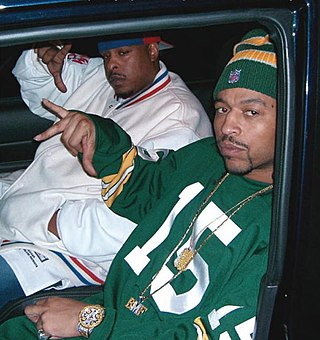
The Black Mafia Family (BMF) was a drug trafficking and money laundering organization in the United States.

The Organized Crime Drug Enforcement Task Force (OCDETF) is a federal drug enforcement program in the United States, overseen by the Attorney General and the Department of Justice. The principal mission of the OCDETF program is to identify, disrupt, and dismantle the major drug trafficking operations and tackle related crimes, such as money laundering, tax and weapon violations, and violent crime, and prosecute those primarily responsible for the nation's drug supply.

Transnational organized crime (TOC) is organized crime coordinated across national borders, involving groups or markets of individuals working in more than one country to plan and execute illegal business ventures. In order to achieve their goals, these criminal groups use systematic violence and corruption. Common transnational organized crimes include conveying drugs, conveying arms, trafficking for sex, toxic waste disposal, materials theft and poaching.
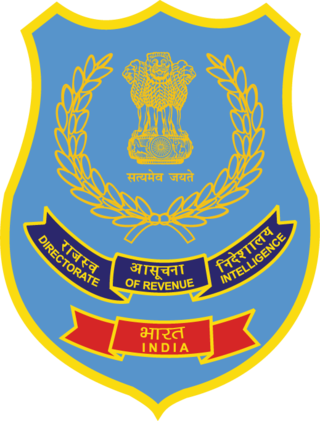
The Directorate of Revenue Intelligence (DRI) is an Indian intelligence agency. It is India's apex anti-smuggling intelligence, investigations and operations agency.

The Anti-Narcotics Force is a federal executive bureau of the Government of Pakistan, tasked with combating the narcotics smuggling and use within Pakistan. ANF works under the umbrella of Pakistan Army and Ministry of Narcotics Control (Pakistan) of which Shahzain Bugti is the minister since March 2022. Due to misconception on Section 4 of ANF ACT 1997, the force's head consisted of the active-duty general officer of Pakistan Army. Although the law prescribes that any competent person may be appointed as Director-General. Currently, a two-star Army Officer, Major general Muhammad Aniq Ur Rehman Malik is deputed as Director-General. The ANF also has sole responsibility for coordinating and pursuing Pakistan narcotics investigations abroad.
Law enforcement in Azerbaijan comes under the control of the Ministry of Internal Affairs of Azerbaijan, which administers the National Police of the Republic of Azerbaijan. Admitted to the Organization for Security and Co-operation in Europe (OSCE) on 30 January 1992, with an OSCE office opening in Baku on 16 November 1999, and as a member of INTERPOL, the National police force is well integrated into the law enforcement network of European countries.

Barry Cooper is an American drug reform activist and filmmaker. Formerly a police officer in Texas, Cooper is best known for KopBusters, a series of online videos in which he attempts to document police misconduct, and Never Get Busted Again, a series of videos aimed at teaching drug users how to evade arrest by the police.
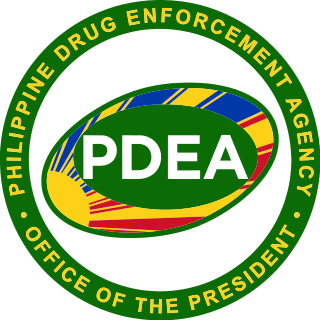
The Philippine Drug Enforcement Agency is the lead anti-drug law enforcement agency, responsible for preventing, investigating and combating any dangerous drugs, controlled precursors and essential chemicals within the Philippines. The agency is tasked with the enforcement of the penal and regulatory provisions of Republic Act No. 9165, otherwise known as the Comprehensive Dangerous Drugs Act of 2002.
A specialist law enforcement agency is a law enforcement agency which specialises in the types of laws it enforces, or types of activities it undertakes, or geography it enforces laws in, or these in combination.

The Narcotics Control Bureau is an Indian central law enforcement and intelligence agency under the Ministry of Home Affairs, Government of India. The agency is tasked with combating drug trafficking and the use of illegal substances under the provisions of Narcotic Drugs and Psychotropic Substances Act.

In the United States, the state police is a police body unique to each U.S. state, having statewide authority to conduct law enforcement activities and criminal investigations. In general, state police officers or highway patrol officers, known as state troopers, perform functions that do not fall within the jurisdiction of the county sheriff, such as enforcing traffic laws on state highways and interstate expressways, overseeing the security of the state capitol complex, protecting the governor, training new officers for local police forces too small to operate an academy and providing technological and scientific services. They support local police and help to coordinate multi-jurisdictional task force activity in serious or complicated cases in those states that grant full police powers statewide.
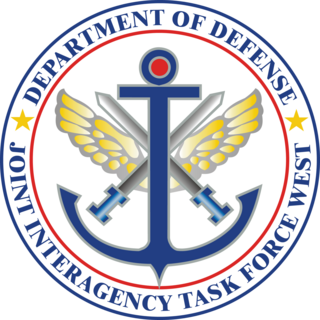
Joint Interagency Task Force West is a standing United States military joint task force with the mission of combating drug-related transnational organized crime in the Indo-Asia-Pacific. JIATF West's area of responsibility (AOR) is that of United States Indo-Pacific Command (USINDOPACOM). JIATF West is one of two Joint Interagency Task Forces with a counter-narcotics mission. The other is Joint Interagency Task Force South. The task force is run as USPACOM's "executive agent" for counterdrug activities providing support to partner nation law enforcement. Approximately 100 active duty and reserve U.S. military forces; Department of Defense civilian employees; contractors; and U.S. and foreign law enforcement agency personnel are members of the task force.
Drug trafficking organizations are defined by the United States Department of Justice as, "complex organizations with highly defined command-and-control structures that produce, transport, and/or distribute large quantity "Law enforcement reporting indicates that Mexican DTOs maintain drug distribution networks, or supply drugs to distributors, in at least 230 U.S. cities." The use of weapons and fear are commonplace in trafficking which often lead to other crimes in the process. The structures of many of these organizations are of a para-military nature using armed combatants to protect their stock of illegal drugs from growth to delivery.

Aviation Drug-Trafficking Control Act of 1984 is a United States Federal law amending the Federal Aviation Act of 1958. The statutory law authorized criminal penalties for the unlawful aerial transportation of controlled substances. The Act of Congress mandated the revocation of aircraft registrations and airman certificates by the Federal Aviation Administration whereas an aircraft aviator knowingly engages in the transit of illicitly used drugs. The Act established authority and a statute of limitations for the reissuance of airman certificates by the United States Secretary of Transportation.

Project Southern Tempest was a major U.S. Immigration and Customs Enforcement (ICE) operation conducted between December 2010 and February 2011 targeting transnational street gang members with ties to drug cartels in Mexico, as part of the ongoing law enforcement initiative known as Operation Community Shield.
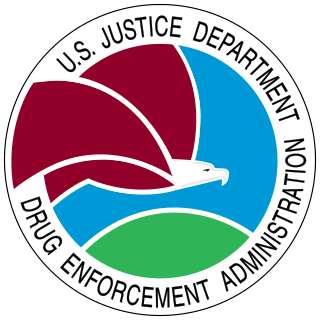
The Office of National Security Intelligence of the United States Drug Enforcement Administration (DEA), established in 1973, helps initiate new investigations of major drug organizations, strengthens ongoing ones and subsequent prosecutions, develops information that leads to seizures and arrests, and provides policy makers with illegal drug trade trend information upon which programmatic decisions can be based. Additionally, the intelligence program has been one of the federal organizations that make up the United States Intelligence Community since 2006.

Uttam Anthony Singh Dhillon is an American attorney and law enforcement official who served as Acting Administrator of the Drug Enforcement Administration from July 2, 2018, to May 18, 2020. He is married to Janet Dhillon, a former commissioner of the Equal Employment Opportunity Commission.
















